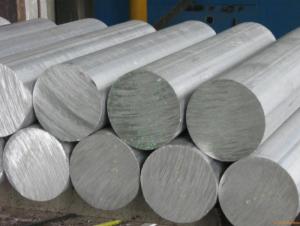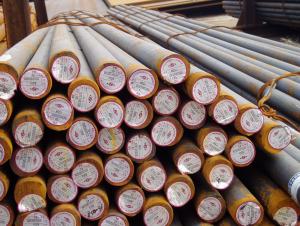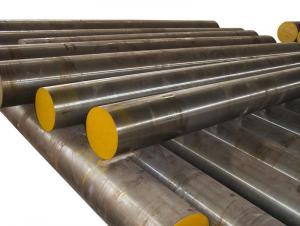hot rolled Round BAR
- Loading Port:
- China Main Port
- Payment Terms:
- TT OR LC
- Min Order Qty:
- -
- Supply Capability:
- -
OKorder Service Pledge
OKorder Financial Service
You Might Also Like
used in construction and a large number of architectural and engineering structures.
4. Some special round bar can be used for automotive engine and transmission components, bearing, rails machine tools and wire rope.
Packaging & Delivery of American Standard Round Bar
Packaging Detail: All goods are packed in bundle with steel strips and shipped by break bulk vessel or container (depend on target market and different ports)
Delivery Detail: 45 days
Trade terms: FOB, CFR, CIF
MOQ: 25 tons per specification; we can negotiate the quantity if the specification is normal or we have stock of one specification.
Weight: Theprice invoicing on theoretical weight basis or actual weight basis depends on customer’s request.
Shipment: The shipment of bulk break or container is depends on customer’s request and the situation of the port of destination.
Documents given: Full set of original clean on board bill of lading; Original signed commercial invoice; Original packing list; Policy of insurance; Certificate of origin and what the target market needs.
Production Flow of American Standard Round Bar
The common processes are preheated forging quenching, dual refinement solution process, cooling quenching and isothermal quenching. We use heat treatment for dual refinement solution process.
Quality Assurance of American Standard Round Bar
1. We will strictly inspect our production that we sold according to the customer’s request.
2. Quality should be in conformity with the specification of the manufacturer. Quantity and packing conditions should be in conformity with the term in the contract.
3. Should the packing found damaged, the buyer has the right to claim to the seller.
- Q:What are the considerations for selecting the right steel grade for a round bar?
- When selecting the right steel grade for a round bar, there are several considerations to be taken into account. Firstly, it is important to consider the intended application of the round bar. Different steel grades have varying properties that make them suitable for specific purposes. For example, if the round bar will be used in a high-temperature environment, a steel grade with excellent heat resistance such as stainless steel or high-alloy steel would be ideal. On the other hand, if the round bar will be used in structural applications, a steel grade with good strength and ductility, such as carbon steel, may be more appropriate. Another consideration is the desired mechanical properties of the round bar. This includes factors such as the required tensile strength, yield strength, hardness, and toughness. These properties can vary significantly between different steel grades, so it is important to choose a grade that meets the specific requirements of the application. The corrosion resistance of the steel grade is also an important consideration. If the round bar will be exposed to corrosive environments, such as in marine or chemical applications, a stainless steel grade with high resistance to corrosion would be recommended. Alternatively, if corrosion resistance is not a major concern, a carbon steel grade may be more cost-effective. Cost is another factor that should be taken into consideration when selecting a steel grade for a round bar. Different steel grades have varying costs based on factors such as availability, demand, and manufacturing processes. It is important to balance the desired properties of the round bar with the available budget to ensure cost-effectiveness. Furthermore, it is important to consider the manufacturability of the steel grade. Some steel grades may be more difficult to machine or weld, which can impact the production process and cost. It is important to choose a steel grade that is readily available and can be easily processed to meet the required specifications. Lastly, it is always advisable to consult with steel suppliers, engineers, or metallurgists to ensure that the chosen steel grade aligns with the specific requirements of the application. They can provide valuable insights and recommendations based on their expertise and experience in the industry.
- Q:What are the factors to consider when selecting a steel round bar?
- There are several factors to take into account when choosing a steel round bar. Firstly, it is crucial to evaluate the grade of steel. Each grade has different properties and strengths, so it is important to consider the specific application and requirements. For instance, if high corrosion resistance is needed, stainless steel grades such as 304 or 316 may be appropriate, while carbon steel grades like A36 or 1018 may be more suitable for structural purposes. Secondly, the dimensions and size of the round bar should be considered. This includes the diameter, length, and tolerance requirements. The size should be chosen based on the specific application, load-bearing capacity, and available installation space. Thirdly, the condition and surface finish of the round bar should be assessed. This includes factors like surface roughness, straightness, and any surface defects. The surface finish should be selected based on the desired aesthetics, functional requirements, and manufacturing process. Another important aspect is the availability and cost of the steel round bar. It is crucial to consider the availability of the desired grade and size from suppliers, as well as the associated cost. Comparing prices from different suppliers is advisable to ensure the best value for money. Furthermore, it is necessary to evaluate the required mechanical properties of the steel round bar. This includes factors like tensile strength, yield strength, hardness, and ductility. The mechanical properties should align with the intended application and load-bearing requirements. Lastly, any additional requirements or certifications should be considered. This could include compliance with specific industry standards (e.g., ASTM, ISO), certifications (e.g., RoHS, REACH), or specific testing requirements (e.g., ultrasonic testing, impact testing). In conclusion, selecting a steel round bar involves considering the grade, dimensions, surface finish, availability, cost, mechanical properties, and any additional requirements. Taking these factors into account will ensure that the chosen steel round bar is suitable for the intended application and meets all necessary specifications.
- Q:Can steel round bars be used for making cutlery or kitchen utensils?
- Certainly, cutlery or kitchen utensils can indeed be crafted using steel round bars. Steel is a favored option for kitchen utensils due to its robustness, endurance, and ability to resist corrosion. Nevertheless, the specific steel variant and the manufacturing process employed will determine its suitability for culinary purposes. Stainless steel, for instance, is highly recommended for cutlery and kitchen utensils due to its resistance to rust and stains, effortless cleaning, and non-reactivity with food. Moreover, steel round bars can be effortlessly molded and shaped into a myriad of utensil designs, rendering them an adaptable material for the production of cutlery and kitchenware.
- Q:What are the common alloying elements used in steel round bars?
- The common alloying elements used in steel round bars are carbon, manganese, silicon, and sometimes chromium, nickel, and molybdenum.
- Q:How do steel round bars perform under bending or flexing forces?
- Steel round bars exhibit excellent performance when subjected to bending or flexing forces due to their exceptional tensile strength and ductility. Their ability to resist deformation and retain their shape makes them highly suitable for various applications in construction, manufacturing, and engineering. Moreover, the combination of high strength and ductility enables these bars to evenly distribute and absorb applied loads, thereby minimizing the risk of failure or breakage. To further enhance the behavior of steel round bars under bending or flexing forces, several factors come into play, including alloy composition, heat treatment, and manufacturing processes. Different grades of steel offer varying levels of strength, toughness, and bending resistance. Additionally, heat treatment techniques such as quenching and tempering can significantly enhance the bars' mechanical properties, rendering them more resistant to bending and flexing. Nevertheless, it is crucial to acknowledge that excessive bending or flexing can result in permanent deformation or failure of steel round bars. Overloading or repeatedly subjecting the material to bending beyond its limits can lead to stress concentrations, microcracks, or even fractures. Consequently, it is of utmost importance to establish appropriate bending limits and ensure proper design and installation to uphold the structural integrity and safety of steel round bars when exposed to bending or flexing forces.
- Q:Are steel round bars suitable for automotive applications?
- Yes, steel round bars are commonly used in automotive applications due to their high strength, durability, and versatility. They are often used to manufacture components such as axles, crankshafts, and suspension systems, as they provide the necessary strength and support required for these critical automotive parts.
- Q:Are steel round bars available in metric sizes?
- Yes, steel round bars are available in metric sizes. In addition to the standard imperial sizes, many manufacturers and suppliers offer steel round bars in metric measurements to cater to the needs of customers who use the metric system. These metric sizes are commonly used in countries that follow the metric system as their standard unit of measurement. They provide a range of metric diameters and lengths to suit various applications and industries. It is recommended to check with the specific supplier or manufacturer to ensure the availability of steel round bars in the desired metric sizes.
- Q:Can steel round bars be used in the production of power tools?
- Yes, steel round bars can be used in the production of power tools. Steel is a durable and strong material that is commonly used in the manufacturing of various tools and machinery, including power tools. Steel round bars can be used to create the body, handles, and other components of power tools, providing stability, strength, and longevity. The steel used in power tools is often selected for its high tensile strength and resistance to wear and tear. Additionally, steel can be easily machined, allowing for precise shaping and customization of power tool components. Overall, steel round bars are a suitable choice for the production of power tools due to their strength, durability, and versatility.
- Q:What are the different types of steel round bars used in the agricultural sector?
- In the agricultural sector, there are several types of steel round bars that are commonly used due to their strength, durability, and versatility. These bars play a crucial role in various agricultural applications. 1. Mild Steel Round Bars: Mild steel is one of the most widely used types of steel in the agricultural sector. It offers excellent strength and is relatively low in cost. Mild steel round bars are commonly used in the construction of agricultural equipment, such as plows, cultivators, and harrows. 2. Carbon Steel Round Bars: Carbon steel round bars are known for their high strength and toughness. They can withstand heavy loads and are ideal for applications that require superior durability. Carbon steel round bars are commonly used in the manufacturing of tractor parts, tillage tools, and other heavy-duty agricultural machinery. 3. Alloy Steel Round Bars: Alloy steel round bars are made by adding various alloying elements to steel, such as chromium, nickel, or molybdenum. These elements enhance the strength, hardness, and corrosion resistance of the steel. In the agricultural sector, alloy steel round bars are often used in the manufacturing of high-performance components, such as gears, axles, and shafts. 4. Stainless Steel Round Bars: Stainless steel round bars are highly resistant to corrosion and have excellent mechanical properties. They are commonly used in agricultural applications that require resistance to moisture, chemicals, and harsh environments. Stainless steel round bars are often utilized in the manufacturing of dairy equipment, storage tanks, and irrigation systems. 5. Tool Steel Round Bars: Tool steel round bars are specifically designed to withstand high temperatures, abrasion, and impact. They are used in agricultural applications that involve cutting, shaping, or drilling. Tool steel round bars are commonly used in the production of blades, cutting tools, and machinery parts for crop harvesting and processing. It is important to consider the specific requirements and conditions of each agricultural application when selecting the appropriate type of steel round bar. By choosing the right steel round bar, farmers and agricultural professionals can ensure the reliability and longevity of their equipment and machinery.
- Q:Are steel round bars available in different shapes other than round?
- No, steel round bars are specifically designed and manufactured in a cylindrical shape.
1. Manufacturer Overview |
|
|---|---|
| Location | |
| Year Established | |
| Annual Output Value | |
| Main Markets | |
| Company Certifications | |
2. Manufacturer Certificates |
|
|---|---|
| a) Certification Name | |
| Range | |
| Reference | |
| Validity Period | |
3. Manufacturer Capability |
|
|---|---|
| a)Trade Capacity | |
| Nearest Port | |
| Export Percentage | |
| No.of Employees in Trade Department | |
| Language Spoken: | |
| b)Factory Information | |
| Factory Size: | |
| No. of Production Lines | |
| Contract Manufacturing | |
| Product Price Range | |
Send your message to us
hot rolled Round BAR
- Loading Port:
- China Main Port
- Payment Terms:
- TT OR LC
- Min Order Qty:
- -
- Supply Capability:
- -
OKorder Service Pledge
OKorder Financial Service
Similar products
New products
Hot products
Related keywords































